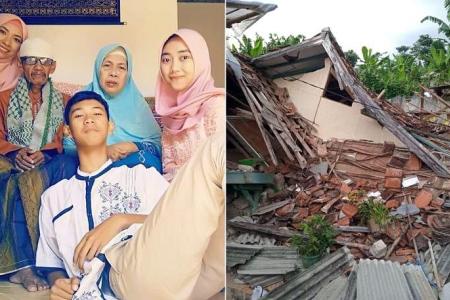‘Not enough food and medicine, they are cold’: Maid says relatives crammed into tent after Java quake
After learning of the 5.6-magnitude earthquake that hit her hometown on Monday afternoon, Indonesian maid Dian Rodiah spent seven frantic hours trying to contact her family.
She repeatedly rang her parents, who live in the Cianjur regency - the epicentre of the West Java earthquake - but her calls could not get through.
“I was very shocked when I heard the news about the quake from my friend in Cianjur. I was anxious all day,” said Ms Dian, 44, whose employers are a British-Japanese couple living in Tiong Bahru.
Around 8.30pm on Monday, her mother finally picked up her call, although the connection was choppy.
The quake had severely disrupted telecommunications and electricity. Cianjur is about 75km south of Jakarta, and her parents live in the regency’s Cibeber district.
Her mother told her that their house was still intact, and only the television and some vases broke in the tremors. But other relatives were not as lucky.
Ms Dian’s nephew, who lives with her parents, later told her that her sister-in-law’s house, situated on hilly terrain, was flattened by the temblor, and the family of four were moved to a makeshift shelter.
The house of her sister-in-law, Nia, had concrete walls, bamboo reinforcements and corrugated metal sheets for the roof. Ms Nia’s husband, the family’s sole breadwinner, works in a wet market.
“I felt very sad. (Nia’s) family does not have much income. It is hard to get money for food, and now their house is destroyed,” said Ms Dian.
She later learnt from Ms Nia, 48, that she and her husband had gone out and left their two children at home. Their nine-year-old son was hit by a brick when the house came crashing down. He suffered some bleeding.
“Nia’s husband was in the wet market when he heard about the earthquake. He thought his children had died when the house fell, and he collapsed in the market,” added Ms Dian.
Fortunately, Ms Nia’s daughter, 16, and the son managed to scramble out of the house before it turned into a pile of rubble.
Her husband got a lift back to where their house once stood, and was later reunited with Ms Nia and their children at a makeshift shelter nearby.
They are among more than 61,000 who were displaced from their homes by the earthquake. At least 271 people were killed and around 2,000 were injured, according to The Jakarta Post. The quake damaged more than 56,000 houses, CNN reported.
Ms Dian’s friend - the one who had told her about the quake - has been visiting Ms Nia and her family at the shelter every day to give the maid an update on their situation.
“The conditions at the shelter are not very good... (It’s) crowded and small. There is not enough food and medicine because the place is remote, and the roads leading to it have collapsed.”
The family eats uncooked instant noodles because hot water is not available. “They ate noodles like crackers,” said Ms Dian.
“It was raining yesterday (Wednesday). They were wet and cold.”
Ms Dian and her domestic worker friends in Singapore are raising money to help her sister-in-law’s family and others in the remote shelter.
Meanwhile, the volleyball team she plays with will hold a charity tournament to raise money for the earthquake victims on Dec 4.
Ms Dian, who has been working in Singapore for 15 years, is part of a large group of foreign maids who meet in Kallang on their days off to play volleyball.
A portion of the funds raised from the tournament will go towards helping Ms Nia’s family and others at the remote shelter.
The Ministry of Foreign Affairs said on Thursday that the Government would contribute US$100,000 (S$137,500) to the Singapore Red Cross (SRC) to support disaster relief and humanitarian efforts in West Java.
This adds to the US$50,000 that SRC had pledged on Wednesday to support the earthquake survivors and communities.
Get The New Paper on your phone with the free TNP app. Download from the Apple App Store or Google Play Store now


